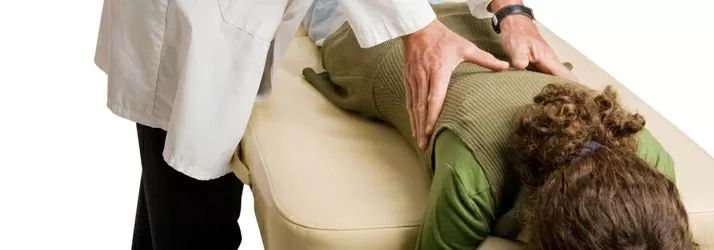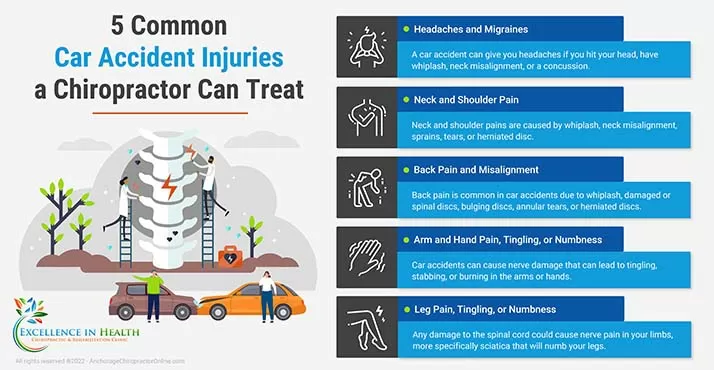5 Common Car Accident Injuries a Chiropractor Can Treat

While you may feel car accident injuries immediately, you may not notice some injuries for several days, or sometimes even weeks. If you feel your symptoms are minor, you might try to treat your injury at home without visiting a doctor. However, having professional guidance on how to recover is essential.
Minor symptoms, like headaches, can last longer and cause several other issues if left untreated. Chiropractors can help reduce your pain caused by the injuries, and with enough time, may be able to remedy your discomfort entirely.
Trained chiropractors can help you heal and rehabilitate from car accidents faster. They will assess your injuries and create the right recovery plan for you. Here are five common car accident injuries a chiropractor can treat at Excellence in Health in Anchorage.
Do you have injuries from a car accident? Contact Excellence in Health to get help in your recovery.

1. Headaches
There are several reasons you may start getting headaches after a car accident.
Whiplash
One of the most common causes is whiplash, also known as a cervical acceleration deacceleration (CAD) injury. This occurs when the head and neck jerk forward and backward in a sudden motion. It is common in most motor vehicle accidents, but symptoms may not show up for hours or even days after the incident.
If the pain of your headaches stems from the back part of your head, it could likely be whiplash. The pain may radiate to the top or front of your head, in your temples, or down your neck. These migraines may be constant or come and go.
Neck Misalignment
Headaches can also occur from neck misalignment caused by a car accident. If one of the vertebras in your neck is misaligned, it can cause headaches from the tension.
Head Trauma
Your head may also hurt from hitting your head on the steering wheel, window, or another object in the car. The impact of hitting your head during the accident can lead to constant headaches.
If you hit your head hard enough, it could cause a concussion. Concussions occur when the brain has been shaken rapidly, resulting in a traumatic brain injury (TBI). A common sign that you've received a concussion after an accident is memory loss of the event or other memories.
Concussions can also cause symptoms such as:
- Confusion
- Dizziness
- Blurred Vision
- Trouble Balancing
2. Neck and Shoulder Pain
Neck and shoulder pain can be a common injury after a motor vehicle accident.
Sprains and Tears
Whiplash can also be an associated cause of pain in this area as the movement can cause straining, tearing, and damage to ligaments, muscles, nerves, and connective tissues in the neck.
These injuries can cause pain, tenderness, and stiffness in the neck and shoulders. A muscle strain can also cause reduced movement of the neck and muscle spasms.
Pinched Nerves
High-impact collisions can also lead to pinched nerves. The force from the impact can cause intervertebral discs in the cervical spine to slip out of place from between the vertebrae. When this happens, the discs may compress nerves in the spinal cord, you may notice pain, weakness, tingling, and numbness in the neck, shoulders, arms, hands, and fingers.
Shoulder Injuries
Neck injuries can spread into your shoulders. However, shoulder pain can be caused by a torn rotator cuff- a group of muscles surrounding the shoulder joint. During the car crash, you could have been thrown against the steering wheel, resulting in injuring the soft tissues in that area.
Shoulder injuries can include various symptoms like:
- Shooting Pain
- Tingling
- Numbness
- Burning sensations
- Loss of motion
Are you experiencing neck or shoulder pains? Contact Excellence in Health for pain relief. .
3. Back Pain
Similar to headaches, neck, and shoulder injuries, whiplash can cause back pain. Since car crashes are violent, they can cause significant pain in the upper and lower back.
Lumbar Spine Injury
Another reason could be from sprains and strains in your lumbar spine. The force of impact can cause muscles, tendons, and ligaments in the lower back to overstretch or tear. These sprains and strains can usually lead to acute low back pain, tightness, and muscle spasms.
Spinal Disc Injury
There is also a possibility that one or several spinal discs get damaged or displaced. The spine has 23 discs that sit between vertebrae to provide cushioning and support. Common disc injuries can include bulging discs, annular tears, and herniated discs.
Bulging discs is when a disc shifts out of place and protrudes into the spinal cord. Annular tears are when a crack forms in a disc's tough outer ring of ligaments and can cause localized pain and inflammation around the damaged disc. Herniated discs are when the tear occurs, leaking the inner jelly-like nucleus of a disc into the spinal canal. These injuries can cause nerve pain if a disc fragment presses against or irritates the nearby spinal nerves.
Facet Joint Injury
Joint pain can also occur from a car crash. Injury to the facet joints that connect the vertebrae in your spine can typically cause low back pain, inflammation, and stiffness.
4. Arm and Hand Pain, Tingling, or Numbness
The violence of a car accident can cause damage to your spinal cord. The nerves that stem from your brain and spinal cord can become weak, numb, or painful if they're damaged or severed. You may experience tingling, stabbing, or burning if the nerve is pinched.
When too much pressure is applied to the nerve by surrounding tissue, it can cause a pinched nerve. Some may find the pain increases while they sleep. You may also experience these other symptoms of pinched nerves:
- Foot or hand frequently "falling asleep"
- Muscle weakness
- Numbness or decreased sensation
- Sharp, aching, or burning pain (it may radiate out from the affected area)
- Tingling sensations (paresthesia)
You may also feel pain in your arms or hands if they collide with another object during the crash. The soft tissues, muscles, ligaments, tendons, joints, or hard bones, may stretch, tear, or shatter.
5. Leg Pain Tingling, or Numbness
Much like the pain in your arms or hands, legs can be affected by pinched nerves as well. The feelings of pain, tingling, or numbness can be felt through your legs.
Sciatica
You may also be experiencing sciatica. The sciatic nerve runs from the lower back, the hips and buttocks, and down the legs. This pinched nerve can cause your legs to go numb.
The pain can run from your lower back through your legs and become more painful when sitting for a while. You may also experience a loss of control in your bladder or bowels, muscle weakness, or tingling. It's essential to seek a doctor if you develop sciatica after your accident.
Spinal Cord Compression
Spinal cord compression can also cause pain anywhere in the spine of your neck (cervical spine), lower back (lumbar spine), arms, or legs. Symptoms of spinal compression can include:
- Limping
- Losing sensation in your feet
- Poor hand or leg coordination
- Pain and stiffness in the neck or back
- Burning pain in arms, buttocks, or legs
- Numbness, weakness, or cramping in arms, hands, or legs
- Severe pain or weakness in the legs, making it difficult to get up or walk.
Seeking Treatment: Visit a Chiropractor After a Car Accident
If you are experiencing any of these injures after a car accident, you should turn to a chiropractor to help you recover. At Excellence in Health, Dr. Ross utilizes digital imaging to diagnose the structural and skeletal problems associated with a car accident. We will create a chiropractic treatment plan to return you to pre-injury status, including:
- Chiropractic Manipulation
- Physiotherapy modalities
- Manual therapy and/or massage therapy
- Rehabilitative Exercise therapy
- Pain management
- Occupational Therapy
- Intermittent Traction
At Excellence in Health Chiropractic & Rehabilitation Clinic, our trained, friendly team of professionals will help you recover to your full potential and feel yourself again after a car accident.
Ready to get your life back after a car accident? Contact Excellence in Health to start your treatment plan.

Excellence In Health Chiropractic & Rehabilitation Clinic
2008 E Northern Lights Blvd #100
Anchorage, AK 99508

